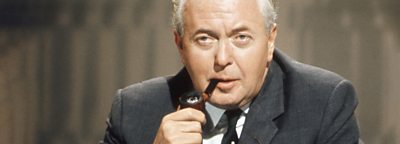Image: Harold Wilson in 1970. Video: Extract from 'The Making of Yesterday's Men'. First broadcast on Βι¶ΉΤΌΕΔ Parliament 2013.p02gc1jd
Straight-dealing is one of the principles of Βι¶ΉΤΌΕΔ programme making, but it has not always been followed. The Βι¶ΉΤΌΕΔ enraged Harold Wilson and his outgoing government after they lost the 1970 General Election. They were effectively tricked into taking part in a programme that would ridicule them.
Had Wilson and his front-benchers known, for example, that the programme would take as its title a soundbite from their own campaign against the Conservatives (they called the Tories "yesterday's men"), they would not have agreed to take part. Later Huw Wheldon, Managing Director of Βι¶ΉΤΌΕΔ Television, conceded that it was like making a programme about doctors and calling it Quack Quack.
Along the way Harold Wilson, a touchy individual at the best of times, was put out by the reporter's question about how he was profiting from the sale of his memoirs. After a shouting match in the studio, Wilson asked the Governors to intervene, and the chairman, Lord Hill, took the unusual and highly risky step of asking to see the programme before it was transmitted. It was agreed that the question about Wilson's memoirs should not be included, prompting the reporter, David Dimbleby, to ask for his name to be removed from the credits.
But that spat was nothing compared with the row that erupted when Wilson's press secretary, Joe Haines, attended a press viewing of the programme ahead of transmission. In places the finished product was more satire than documentary. The icing on the cake was a disrespectful song specially commissioned from pop group The Scaffold, and Yesterday's Men was in stark contrast to a serious and conventional 'balancing' documentary that had been made about the Conservative government a year after the election.
Haines described it as "calculated, deliberate, continuous deceit". Relations with Labour were to remain difficult for some time, and it damaged the Βι¶ΉΤΌΕΔ overall. John Crawley, Chief Assistant to the Director-General, noted: "Most commentators and nearly all politicians concluded that we could not be trusted. It will take ages to live it down."
